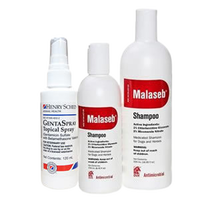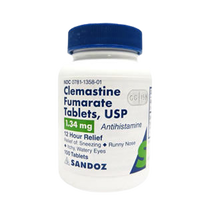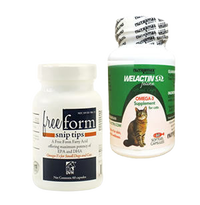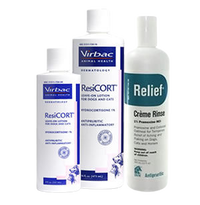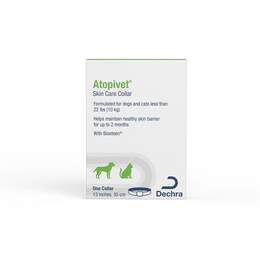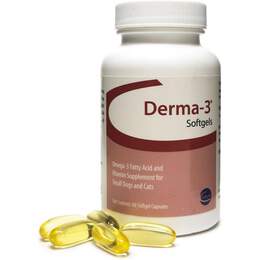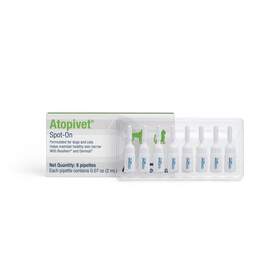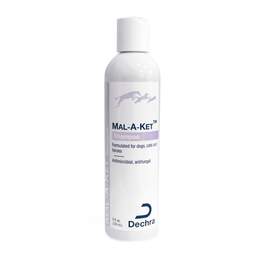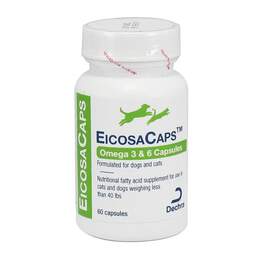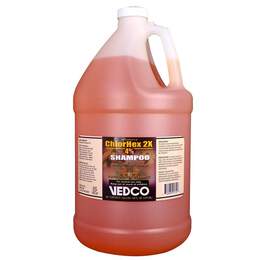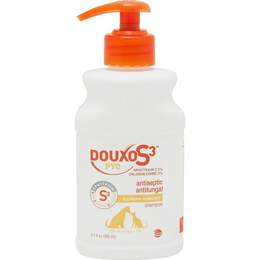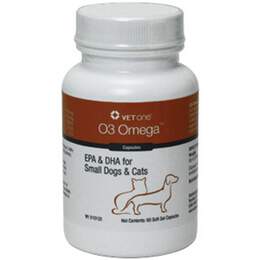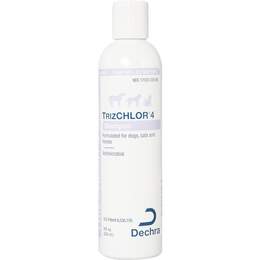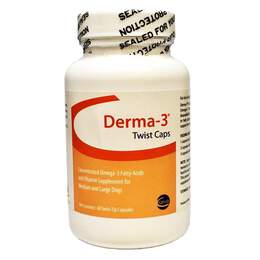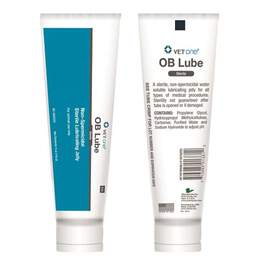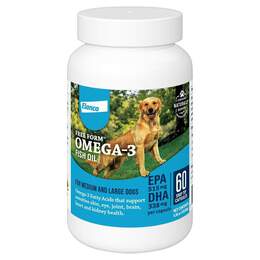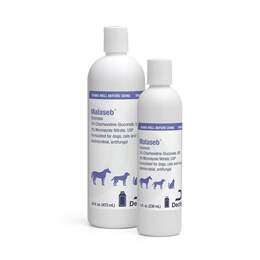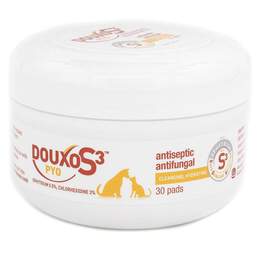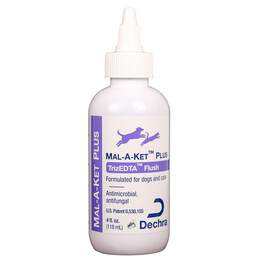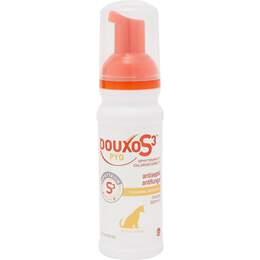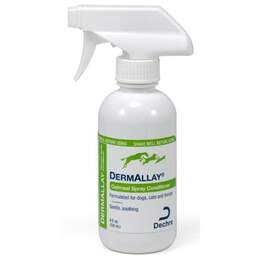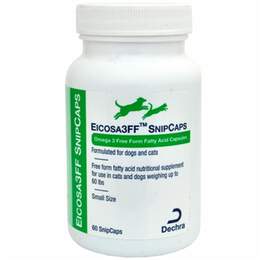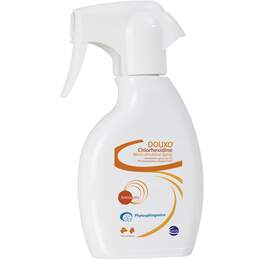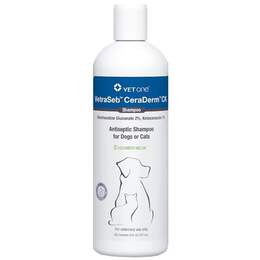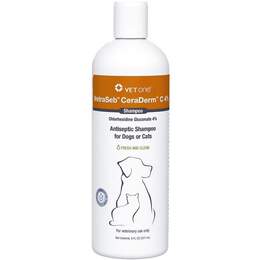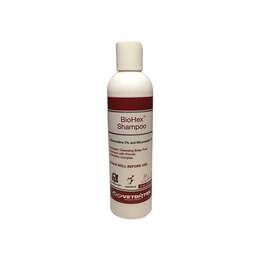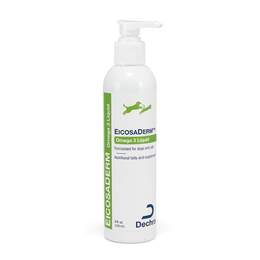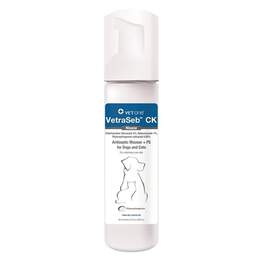Cat Allergy Medication
Featured Categories
HOW CAN I TELL IF MY CAT HAS ALLERGIES?
Allergies are a common problem for cats everywhere. A potential detriment to your cat’s quality of life, allergies are bothersome and frustrating for cats and pet parents. Some of the most common types of cat allergies include flea, airborne, and food allergies.
Your cat may have one allergy, or they could suffer from multiple types. The most frequently-reported cat allergy symptoms include:
- Bloating
- Diarrhea
- Vomiting
- Gas
- Wheezing
- Sneezing
- Coughing
- Rubbing
- Head shaking
- Scratching/Itching
- Skin irritation
- Itchy, watery eyes
- Swollen paws or paw chewing
- Ear itchiness or infection
Skin Conditions in Cats Caused by Allergies
If you notice your cat scratching more than they usually do, they may be suffering from a skin allergy. While occasional scratching is normal in cats, itchy skin can be distressing and uncomfortable for your cat. In the absence of fleas, skin allergies are the most common cause of itchy skin in cats.
Cat's have allergies just like we do, but instead of sneezing, cats' allergic reactions usually present as a skin condition. Allergies that cause skin issues are generally called allergic dermatitis.
In addition to excess scratching, your cat may also bite or lick the affected area, trying to soothe the inflammation and itching that comes with an allergic reaction. In many cases, this will result in hair loss, skin lesions, swelling, and oozy hot spots.
No pet parent likes to see their beloved cat suffering like this. If you notice your cat scratching, licking, or biting a specific area, take note of their symptoms and call your veterinarian as soon as you can. Your veterinarian will examine your cat and discuss their symptoms with you to find what your cat is allergic to.
Below is a list of the common causes of most cat skin allergic reactions.
Flea Bites
Fleas are horrible pests, and cats are often allergic to their saliva, which causes an allergic reaction when they are bitten. The cat's body mounts an immune response, which causes the irritation and itching at the site of the bite. In no time, a tiny flea bite can become a huge patch of irritated, swollen skin. If left untreated for too long, this can lead to a bacterial infection and hair loss.
Cats that suffer from flea allergies may need antihistamines or steroids to help combat their sensitivity to flea saliva and the itchiness it can cause. Your veterinarian will prescribe cat allergy medication to help clear up the symptoms and start your cat on a flea preventative. They will probably schedule a follow-up exam to see how the treatment is progressing.
Inhalant Allergens
Atopic or inhalant allergens can be absorbed by the cat's body when they breathe them into their lungs. These allergens are generally found in your cat's environment. They can be seasonal, such as pollen, or year-round, such as mildew, mold, and dust mites. Common inhalant allergies include weeds, flowers, grass and tree pollens, mildew, dust, mold, cigarette smoke, and perfume.
This type of allergy affects various parts of your cat's body and can lead to hair loss and painful lesions. Work with your veterinarian to find the allergen in your cat's environment and remove it to keep your cat from inhaling it again. Depending on the severity of the allergy, the treatment may consist of steroids and antihistamines for cats to alleviate the symptoms.
Food
Cats rarely have food allergies, but when they do, they may suffer from gastrointestinal issues and skin problems such as irritated, itchy skin, excessive scratching, hair loss, and skin infection. The most common culprits for food allergies in cats include beef, chicken, fish, pork, wheat, and soy. Your veterinarian can help you identify the cause by implementing an elimination diet to find out which ingredient your cat is allergic to. They can also help treat any symptoms with allergy meds for cats.
Contact Allergens
Contact allergens are just what they sound like, substances that cause an allergic reaction after physical contact. They are not very common in cats, but they do sometimes happen. Common contact allergens and irritants include shampoos, flea prevention medication, plastic, fabrics, and cleaning products. Again, the key is identifying what the allergen is and removing it from their environment. The allergic reaction will most likely go away.
Even if your cat is an inside cat, they may be susceptible to mold and dust allergies year-round. And pollen can be carried in on your clothing and spread throughout your house, and become irritants that trigger your cat's allergies. If the cause of your cat's allergies is not easily found, your veterinarian can run tests to see if your cat has environmental allergies.
HOW CAN I RELIEVE MY CAT’S ALLERGY SYMPTOMS?
The first step to helping your cat deal with allergies is to schedule a veterinary appointment. You can discuss your cat’s symptoms, and your vet will be able to prescribe or recommend the best antihistamine or other medication for your cat’s specific allergies. If your pet suffers from skin or coat reactions, your veterinarian can recommend shampoos or other topical treatments. Supplements can also help your cat fend off allergens.
Allergy Medicine for Cats to Relieve Discomfort
Although you can keep your cat from having an allergic reaction by identifying the allergen and keeping it away from your cat. However, they are never really cured. The therapies used for cat allergy treatment help manage and control the symptoms, prevent infections and relieve discomfort.
All cats suffering from allergic skin conditions are extremely itchy. The first thing your veterinarian is likely to prescribe is a corticosteroid to reduce inflammation and provide relief from their itchy skin. Many cats with allergic skin conditions also have secondary bacterial infections, so they may also be prescribed antibiotics to help clear it up.
Help keep your cat allergy-free by using veterinarian-approved medication for flea and tick control. You can also purchase dust-free cat litter and remove all possible allergens such as dust, pollen, smoke, and more. In addition, you can bathe your cat to give them some relief. Ask your veterinarian to recommend more ways you can help control your cat's allergy symptoms and treatments you can give them at home.
Ultimately, the correct treatment for your cat's allergies will depend on its underlying cause and will be determined once that cause is identified. Relief from the inflammation, itchiness, and hair loss can come from a variety of prescribed pet medicine that ranges from chewables, tablets or pills, liquids or topicals, or an injection.
Medicated sprays and shampoos are an excellent way to relieve cat skin allergies. With antifungal, antibacterial, deodorizing, anti-itch, and/or cleansing properties, Allivet carries the top veterinarian-recommended products. Choose from a variety of impressively effective shampoos, flushes, and sprays, such as Mal-A-Ket, PhytoVet, Douxo, Malaseb, and much more!
Prescription cat allergy medicine is an excellent way to treat your cat’s allergies. A visit to your veterinarian’s office will help you and your vet create a custom plan to care for your cat. Your veterinarian is familiar with the best allergy medication for cats and can help you choose the best option for your cat. Corticosteroids or antihistamines can provide your cat with relief from their most bothersome, irritating symptoms. Some of the best allergy medicine for cats includes:
- Hydroxyzine (Pamoate or HCL) – This cat allergy medicine has many uses, including relief of allergic and inflammatory conditions like stings and bites. This antihistamine also helps relieve skin itch.
- Prednisone – These oral cat allergy pills are corticosteroids with anti-inflammatory properties to treat inflammatory eye conditions, allergic reactions like asthma or hives, and other allergy symptoms.
- Dexamethasone – This corticosteroid is a useful treatment for severe allergies, skin conditions, and more.
- Cyproheptadine – This cat allergy medicine is an appetite-stimulating antihistamine.
- Atopica – An oral solution, this revolutionary treatment is effective against atopic dermatitis, which is the most common allergic skin condition in cats.
- Mupirocin – This antibiotic ointment inhibits bacterial growth, helping to heal a variety of skin infections that can result from allergic conditions.
Allivet carries all the best over-the-counter cat allergy medicine, shampoos and sprays, supplements, topical lotions and creams, and prescription allergy meds for cats. Prescriptions are easy to fill with Allivet! Simply place your pet’s prescriptions in your cart and check out. We’ll ask for your veterinarian’s information so we can verify the prescription. It’s as simple as that! Browse Allivet’s wide range of options for allergy treatments, select complementary products like Greenies Pill Pockets to conceal your cat’s allergy medicine, and enjoy the convenience of having your cat’s medications, treats, supplements, and other products delivered straight to your door! Choose Allivet to meet all your cat’s prescription and non-prescription needs.
Oral antihistamines allow you to get your cat allergy medicine over the counter. These options range from Chlorpheniramine, Diphenhydramine, Meclizine, Loratadine, and more. Some of the best meds for cat allergies, antihistamines can aid in the relief of allergy symptoms, and many are safe to administer regularly to keep your cat symptom-free.
Skin supplements like Omega, Derma-3, Free Form, EicosaCaps, and other useful products can offer broad-spectrum advantages that include cat allergy relief. Your cat will benefit from incorporating vitamins, minerals, and essential oils into their everyday routine.
Topical creams and lotions are an excellent complement to cat allergy medication. Whether you choose a convenient wipe product like Mal-A-Ket, TrizCHLOR 4, or MalAcetic, an ointment or cream like EnteDerm or Zymox, or a lotion like Miconosol, Allivet offers a wide range of effective topical choices to provide your cat with much-needed allergy symptom relief.
How Do I Order Prescription Allergy Relief for Cats?
To order prescription allergy relief for your cat, you will first need a prescription from your veterinarian. Add your cat's medication to your cart and proceed to checkout once you have finished shopping. During checkout, we will ask for information about your veterinarian and your cat and keep it on file. We will contact them for you and then fill the prescription. Or, if you have the prescription, you can mail it to: Allivet – Rx, 14540 NW 60th Avenue, Miami Lakes, FL 33014.
If we have your email address on file, you will receive email updates on your order each time we reach out to your vet, and then another to let you know when your prescription has been received.


